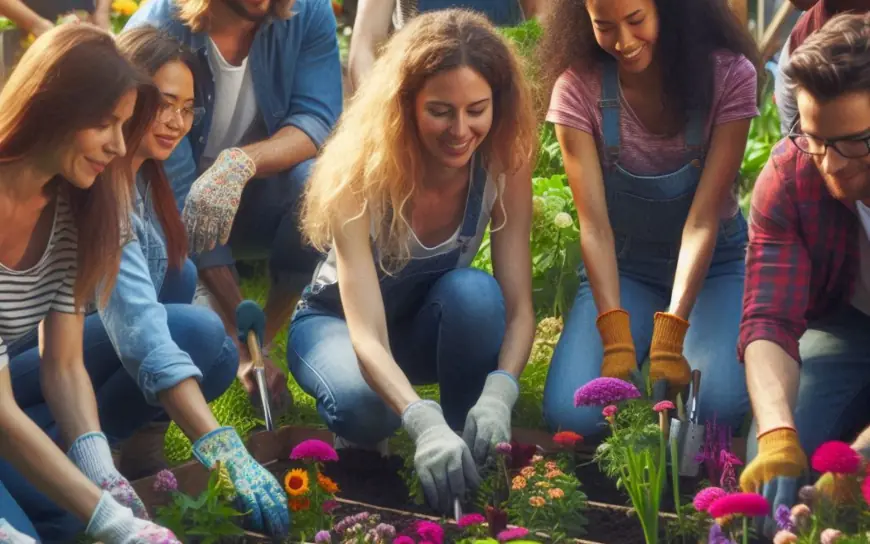Urban planting and its impact on environments and sustainable living.
Urban planting is all about growing plants in a city environment, which can involve anything from rooftop gardens, community plots to window boxes.

Urban planting and its impact on environments and sustainable living
Urban planting is all about growing plants in a city environment, which can involve anything from rooftop gardens, community plots to window boxes. This practice has a slew of benefits: it helps to improve air quality by filtering pollutants, mitigates the urban heat island effect by cooling down concrete-heavy areas, and increases biodiversity by providing habitats for insects and birds. Plus, it's a great way to produce fresh, local food, and can be a therapeutic, stress-relieving hobby.
The Timeless Roots of Urban Planting: From Ancient Gardens to Modern Green Oases
Urban planting has a rich history that dates back to ancient civilizations. During World Wars I and II, urban gardening became a patriotic duty in many countries, including the U.S. and the U.K., as citizens were encouraged to grow their own food to support the war effort. Urban gardening saw a resurgence in the mid-20th century, post-war era, as a response to food shortages and economic challenges.
Today, urban planting initiatives are widespread, focusing on sustainability, community building, and food security. Examples include community gardens, rooftop farms, and vertical gardens. Urban planting has evolved significantly over time, adapting to the needs and challenges of each era. It continues to play a crucial role in enhancing urban environments and promoting sustainable living.
Starting an urban garden is simpler than you might think. Here's a step-by-step guide
1. Choose Your Space
Identify a spot for your garden. It could be a balcony, rooftop, windowsill, or even a vertical wall. Ensure it gets enough sunlight, typically 6-8 hours a day.
2. Select Containers
Opt for pots, boxes, or any recycled container that can hold soil and has drainage holes. For vertical gardening, you can use hanging baskets or wall-mounted planters.
3. Pick Your Plants
Decide what you want to grow based on your space and light conditions. Herbs, leafy greens, tomatoes, and peppers are great for beginners. Look for compact or dwarf varieties if space is limited.
4. Prepare the Soil
Use a good-quality potting mix. It should be well-draining and rich in nutrients. You can also add compost to enrich the soil.
5. Planting
Plant your seeds or seedlings according to the instructions on the package. Make sure to space them properly to avoid overcrowding.
6. Watering
Water your plants regularly but avoid over watering. Most plants prefer to be kept moist but not soggy. The frequency will depend on the plant type and weather conditions.
7. Maintenance
Keep an eye out for pests and diseases. Use natural remedies or organic pesticides. Prune and harvest your plants regularly to encourage new growth and prevent overcrowding.
8. Enjoy
Relish the process and the fresh produce. Gardening can be incredibly rewarding and can turn even the smallest urban space into a green oasis.
Here are few successful urban planting initiatives around the world:
1. High Line, New York City, USA
The High Line is a famous urban park built on a historic freight rail line elevated above the streets on Manhattan’s West Side. It's a prime example of how urban spaces can be transformed into green, public areas that offer both recreational and environmental benefits.
2. Gardens by the Bay, Singapore
This iconic park features large, futuristic-looking Supertrees and a variety of themed gardens. It's a major tourist attraction and a testament to Singapore's commitment to urban greening and sustainability.
3. Edible Schoolyard Project, Berkeley, California, USA
Founded by Alice Waters, this initiative integrates gardening and cooking into the school curriculum. Students learn about food, nutrition, and the environment by growing and preparing their own meals.
4. Greening the Rubble, Christchurch, New Zealand
After the 2011 earthquake, this community-led initiative transformed vacant lots into temporary gardens and parks. It provided much-needed green space and helped to foster community spirit during the city's recovery.
5. The Green Belt Movement, Kenya
Founded by Wangari Maathai, this movement focuses on planting trees to combat deforestation and promote environmental conservation. It has planted over 51 million trees and empowered women by providing them with a source of income.
6. NoordOogst, Amsterdam
This thriving organic self-harvest garden is part of the Urban Agriculture Project and is home to a diverse bounty of over 70 vegetables, berries, and flowers.
It's a cornerstone of the local community, providing fresh produce to residents and serving as a hub for workshops and events.
7. De Moestuin, Utrecht
This social enterprise not only grows organic vegetables but also cultivates community and empowerment. Moestuin employs 70 people, many of whom are distanced from the labor market, and offers a carpentry workshop, a shop, and a lunch café.
These initiatives show how urban planting can transform city spaces into vibrant, sustainable communities and improve the quality of life for city dwellers.
What's Your Reaction?



























